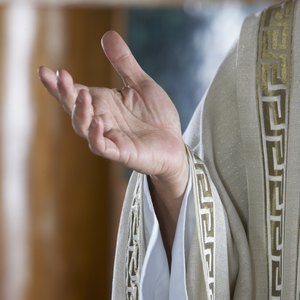
Pastors and other religious leaders get special treatment from the Internal Revenue Service. To begin with, they get the same deductions as any other taxpayer. However, they also get extra write offs and exclusions because of their role as clergy. Pastors are also exempt from Social Security and Medicare withholding, and can completely opt out of the system if they wish.
Self-Employment Tax
Religious organizations don't withhold Social Security and Medicare taxes from their pastors' paychecks. Technically speaking, the Federal Insurance Contribution Act doesn't apply to pastors. Instead, religious leaders pay their contributions through the Self-Employment Contribution Act's tax. The big difference is that with self-employment tax, pastors have to pay both their share of the contribution and the employer share, and they pay it out-of-pocket. Furthermore, self-employment tax is 15.3 percent, as of the 2013 tax year. However, religious leaders can deduct half of what they pay in self-employment tax, even if they don't itemize deductions.
Opt Out of Government Insurance
Pastors can choose to completely opt out of the Medicare and Social Security system. If they do this, they won't have to pay self-employment taxes, but they lose the ability to receive Social Security payments or medical coverage under Medicare. To opt out, a religious leader must have a conscientious objection to public insurance and must file Form 4361 with the IRS. The form must be filed by the second tax year in which the religious leader had at least $400 in earnings from religious work that would have been subject to self-employment tax.
Parsonage and Housing
If a pastor receives free housing, referred to as a parsonage allowance, or a housing allowance from your church that is specifically designated as such, it's usually exempt from income taxes. The pastor can use the tax-free housing allowance to make mortgage payments on a home and then write those payments off, as well. Unfortunately, though, because the housing or parsonage allowance is free from income tax, it is subject to self-employment tax. On the other hand, since it's subject to that tax, it can be added back into income when calculating eligibility for the Earned Income Tax Credit, potentially increasing the size of the credit received.
Unreimbursed Employee Expenses
Pastors who itemize deductions on Schedule A get to deduct any out-of-pocket expenses that they incur in their jobs that exceed 2 percent of their adjusted gross incomes. For instance, when a pastor drives their car to visit a parishioner in the hospital, those miles are deductible. The cost of purchasing and maintaining vestments can be written off, as can any fees for maintaining ministerial credentials. When a pastor sits down with a board member to discuss business and buys lunch, 50 percent of the cost of that lunch is also deductible.
References
- Unitarian Universalist Association of Congregations: Frequently Asked Questions
- IRS: Form 4361 -- Application for Exemption From Self-Employment Tax for Use by Ministers, Members of Religious Orders and Christian Science Practitioners
- Upper New York Annual Conference of the United Methodist Church: Special Clergy Tax Rules
- IRS: Topic 417 - Earnings for Clergy
- IRS: Special EITC Rules
- Nolo: Deductions for Ministers and Other Clergy
Writer Bio
Steve Lander has been a writer since 1996, with experience in the fields of financial services, real estate and technology. His work has appeared in trade publications such as the "Minnesota Real Estate Journal" and "Minnesota Multi-Housing Association Advocate." Lander holds a Bachelor of Arts in political science from Columbia University.

